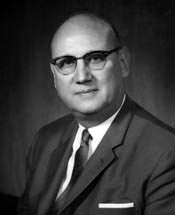E. Ross Adair
E. Ross Adair | |
|---|---|
 | |
| Member of the U.S. House of Representatives from Indiana's 4th district | |
| In office January 3, 1951 – January 3, 1971 | |
| Preceded by | Edward H. Kruse |
| Succeeded by | J. Edward Roush |
| United States Ambassador to Ethiopia | |
| In office July 8, 1971 – February 12, 1974 | |
| Preceded by | William O. Hall |
| Succeeded by | Arthur W. Hummel Jr. |
| Personal details | |
| Born | December 14, 1907 Albion, Indiana |
| Died | May 5, 1983 (aged 75) Fort Wayne, Indiana |
| Political party | Republican |
| Alma mater | Hillsdale College, A.B. George Washington University Law School, J.D. |
| Occupation | Attorney |
Edwin Ross Adair (December 14, 1907 – May 5, 1983) was a U.S. Representative from Indiana.
Early life
Born in Albion, Indiana, Adair attended grade and high schools in that city. He graduated from Hillsdale College in Michigan, A.B., 1928, and from George Washington University Law School, Washington, D.C., LL.B., 1933.
He was admitted to the Indiana bar in 1933 and commenced the practice of law in Fort Wayne, Indiana. He served as probate commissioner of Allen County, Indiana from 1940 to 1950. During World War II, he was called to active duty as a second lieutenant in the Quartermaster Corps Reserve in September 1941 and served until October 1945. He received battle stars for the Normandy, Northern France, Ardennes, Rhine and Central European campaigns.
U.S. Representative
Adair was elected as a Republican from Indiana's 4th congressional district to the Eighty-second and to the nine succeeding Congresses (January 3, 1951 – January 3, 1971). Adair voted in favor of the Civil Rights Acts of 1957,[1] 1960,[2] 1964,[3] and 1968,[4] and the Voting Rights Act of 1965,[5] but voted present on the 24th Amendment to the U.S. Constitution.[6] He was an unsuccessful candidate for reelection in 1970 to the Ninety-second Congress. He served as the United States Ambassador to Ethiopia from 1971 to 1974.
He resumed the practice of law in Fort Wayne, Indiana, where he resided until his death there, May 5, 1983. He was interred at Greenlawn Memorial Park and Mausoleum in Fort Wayne.
See also
References
- ^ "HR 6127. CIVIL RIGHTS ACT OF 1957". GovTrack.us.
- ^ "HR 8601. PASSAGE".
- ^ "H.R. 7152. PASSAGE".
- ^ "TO PASS H.R. 2516, A BILL TO ESTABLISH PENALTIES FOR INTERFERENCE WITH CIVIL RIGHTS. INTERFERENCE WITH A PERSON ENGAGED IN ONE OF THE 8 ACTIVITIES PROTECTED UNDER THIS BILL MUST BE RACIALLY MOTIVATED TO INCUR THE BILL'S PENALTIES".
- ^ "TO PASS H.R. 6400, THE 1965 VOTING RIGHTS ACT".
- ^ "S.J. RES. 29. CONSTITUTIONAL AMENDMENT TO BAN THE USE OF POLL TAX AS A REQUIREMENT FOR VOTING IN FEDERAL ELECTIONS". GovTrack.us.
 This article incorporates public domain material from the Biographical Directory of the United States Congress
This article incorporates public domain material from the Biographical Directory of the United States Congress- United States Congress. "E. Ross Adair (id: A000024)". Biographical Directory of the United States Congress.
- E. Ross Adair at Find a Grave
- 1907 births
- 1983 deaths
- Members of the United States House of Representatives from Indiana
- Ambassadors of the United States to Ethiopia
- Hillsdale College alumni
- Politicians from Fort Wayne, Indiana
- George Washington University Law School alumni
- Indiana Republicans
- Quartermasters
- United States Army officers
- Candidates in the 1970 United States elections
- Republican Party members of the United States House of Representatives
- People from Albion, Indiana
- American army personnel of World War II
- 20th-century American politicians
- 20th-century American diplomats
- United States Army reservists


